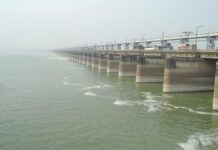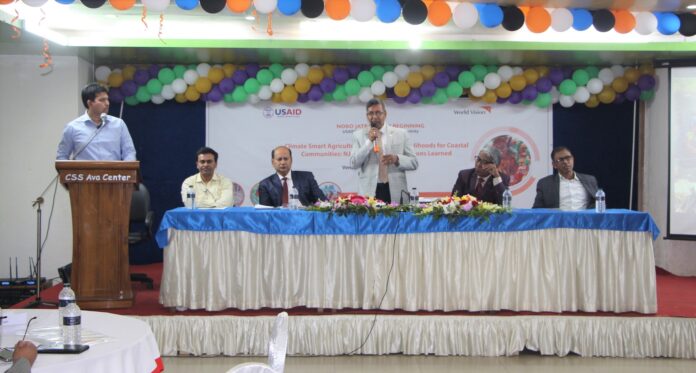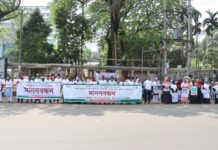Farmers facing problems for weak output market system
Khulna, Monday, 12 December 2022:
Climate Smart Agriculture (CSA) has been reducing food insecurity of 82% farmers in Southwest coastal districts of Satkhira and Khulna, shows a study conducted by World Vision Bangladesh (WVB) under USAID’s Nobo Jatra Project (NJP)-New Beginning.
Although the farmers are benefiting from CSA, due to weak output market system, they are getting less prices of their produces while the consumers are paying double sometime triple amount than the price paid to the producers.
The information was disclosed at an event on Monday at CSS AVA Center in Khulna. The study titled “Climate Smart Agriculture and Off-Farm Livelihood: Lessons Learned in the Context of NJP Intervention” was conducted in Nobo Jatra Project intervention areas.
The project has finished its 7-year-year-long intervention with a fresh two-year extension in 740 villages under 40 unions in Koyra, Dacope upazilas in Khulna and Shyamnagar, Kaliganj upazilas in Satkhira.
NJP provided integrated services to people in Bangladesh’s southwest coastal region from 2015 to 2022. NJP-II will continue services in the area until 2024. WVB in close partnership with the Ministry of Disaster Management and Relief (MoDMR), Winrock International and World Food Programme implemented NJP-I.
On Monday’s event in Khulna, Md Tofazuddin Ahmed, Deputy Director, Department of Fisheries (DFO), Khulna Division; Dr. Arun Kanti Mondal, Director, Department of Livestock, Khulna division; and Md. Faridul Hasan, Additional Director, Department of Agricultural Extension (DAE) were present as special guests.
High officials of Fishers, Livestock, and Agriculture departments were present at the event which was presided over by Dr. Ranak C. Mohanta, acting Chief of Party (CoP) and Senior M&E Manager, NJP, WVB.
Ashish Kumar Halder, Senior Operations Manager, NJP, WVB delivered the welcome speech and thanked government officials from three departments for attending the event and their cooperation during NJP intervention.
The study was conducted following a mixed methods, that shows 92% farmers have been employed through CSA in the project area. Additional income of 94% farmers have been increased through climate smart agriculture.
Climate Smart Agriculture (CSA) refers to productivity, adaptation, and mitigation which is very relevant in the coastal region of Bangladesh, said Prodip Kumar Mondal, Technical Advisor, MSD, Agriculture, Livestock and Private Sector Engagement while sharing the study findings.
Farmers in Khulna and Satkhira are using dike cropping, tower garden, integrated paste management, bag garden, mulching, pitcher irrigation, diversified vegetable production, intercropping and early and delay cultivation in agriculture sector.
On the other hand, farmers in the salinity-prone area have been using saline tolerant fish variety, quick growing variety, green bamboo method, fencing net, two-cycle tilapia production in the NJP area.
In livestock sector, farmers of the southwest coastal region, also profiting from chicken, duck and goat rearing. Farmers are practicing proper disposal, maintaining biosecurity, schedule vaccination, proper feeding, and farming improved chicken species.
Md Tofazuddin Ahmed, Deputy Director, Department of Fisheries (DFO), Khulna Division, said “The coastal region requires some specific plan. Dyke management, depth of ponds and shrimp farms need to be increased because heat and water depth are one of the key reasons that cause shrimp death beside virus attack.”
He also mentioned that putting shade on ponds for vegetable cultivation is not the only solution, “we must keep a portion of the pond or waterbody open as sunlight can enter into the water.”
Md Tofazuddin emphasized on introducing better marketing system for agricultural products of fish, vegetables and livestock.
Dr. Arun Kanti Mondal, Director, Department of Livestock, Khulna division, said “this is great that representatives of Agriculture, Fisheries and Livestock departments have gathered together.”
“It is necessary to promote and protect local varieties of livestock, fishes, and vegetables as farmers can get more profit because the prices of local verities are increasing.”
“Hybrid verity is not bad always, they are meeting local demand. Promoting local varieties is also very crusical,” he said adding that “I appreciated NJP for their activities and my department will continue supporting in livestock sector.”
Md. Faridul Hasan, Additional Director, Department of Agricultural Extension (DAE), said “today’s event is very effective as various information were exchanged among representatives of livestock, agriculture and fisheries departments.”
Thanking NJP of World Vision Bangladesh, he mentioned that “Agriculturalists have been working hard for the development of country’s production and develop the nutritional status.”
“I hope NJP would raise the recommendations of today’s workshop in the big platforms in national level.”
Recommendations:
The experts of Livestock, Fisheries and Agriculture department have provided some recommendations in the event.
The agriculture experts urged the authorities and NGOs, and INGOs to work in strengthening the output market system as the producers get just price of their products.
They also recommended to start early warning system in agriculture in the coastal region to reduce the loss in coastal area during disaster.
To strengthen the output market system, the government officials urged the World Vision Bangladesh to introduce agriculture transport and more collection points in the coastal region.
Aiming to improve gender equitable food security, nutrition and resilience of vulnerable communities, NJP reached 859,704 people with multi-sectoral interventions in Water Sanitation and Hygiene, Maternal Child Health and Nutrition, gender, agriculture and alternative livelihoods, disaster risk reduction and good governance and social accountability.
Home National Agriculture Climate Smart Agriculture reduces food insecurity of 82% farmers in coastal districts:...
































